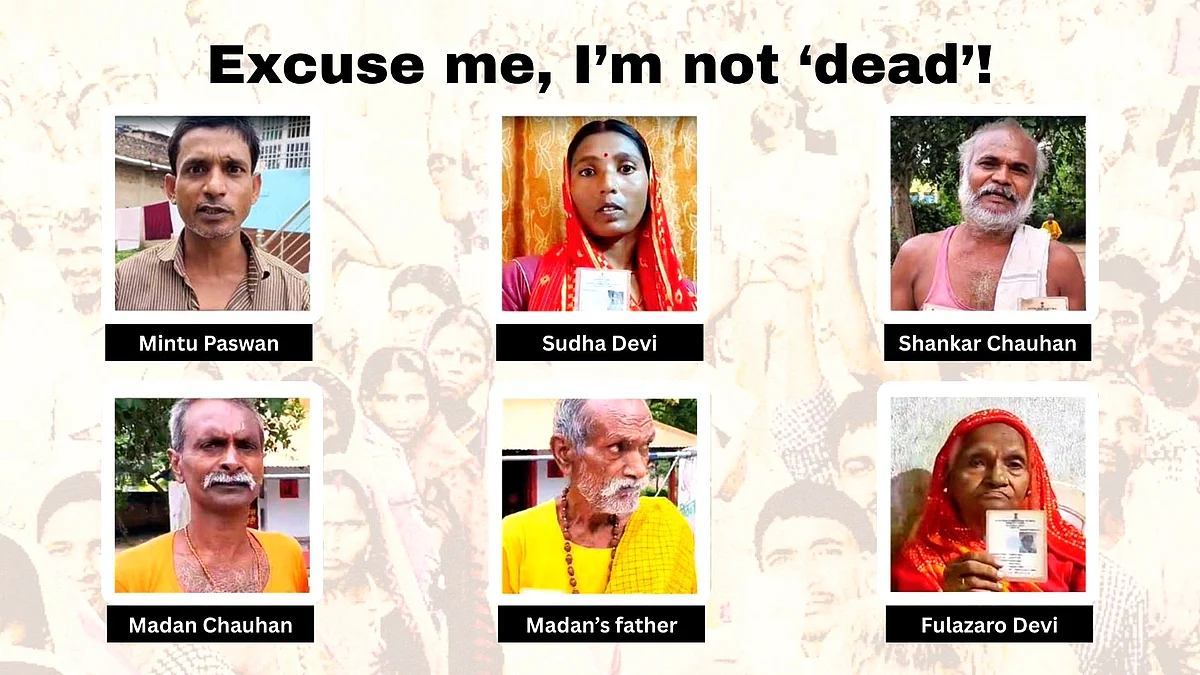POLITICS
Back from the ‘dead’ to tell their tale
The ECI has not acknowledged the anomaly of declaring live voters as dead. Nor has anyone been made accountable for the deletions

Mintu Paswan is 41 years old and he is supposedly ‘dead’. That is, if you go by the Election Commission of India's (ECI) draft rolls for Bihar, made public on 1 August. His name did feature, though, on the state’s revised voter list, published by the ECI on 1 January this year, after a special summary revision.
Mintu panicked on learning that his name had gone missing from the draft list of August — published after the Election Commission ran a controversially rushed ‘special intensive revision’ (SIR) of voter rolls in the state.
With the help of CPI-ML (Liberation) workers in his constituency, Mintu visited the Collectorate to find out how and why this had happened. He was informed that his name was deleted from the rolls because he had been declared ‘dead’. How could such a thing happen?
Neither the Booth-Level Officer (BLO) nor any other official visited his home. “Nobody came to verify,” he says, still looking a bit flummoxed. “No questions were asked. Who could have declared me dead — and why?!” These questions haunt him, he says.
Mintu Paswan was in the national capital for the Supreme Court hearing of petitions challenging the SIR on 12–14 August, and was produced before the court.
A driver from Arrah district in Bihar, Mintu travelled to New Delhi along with others to tell the Supreme Court his story. Only two of them, he and a woman, were allowed to go into the courtroom, and were presented before Justices Surya Kant and Joymalya Bagchi, who are hearing the case.
Published: undefined
On 28 July, during an earlier hearing, before the draft list was published, the bench had observed that if the petitioners could produce 15 voters who were actually alive but had been declared ‘dead’ by the Election Commission, they would intervene and suspend the exercise.
On 12 August, more than 15 such voters turned up at the Supreme Court. Sudhakar Singh, an RJD (Rashtriya Janata Dal) MP from Buxar in Bihar, said trainloads of such voters could be brought to the national capital to demonstrate the extent of arbitrary and cavalier deletions.
The ECI has not acknowledged the anomaly. Nor has anyone been made accountable for the deletions. On 12 August, the Supreme Court bench observed that the deletions could be attributed to unintended ‘errors’ and could even be rectified.
That is poor consolation for Mintu Paswan and others who have been left out of the voter rolls for being ‘dead’. They will have to register as ‘first-time’ voters by filling up Form 6, and produce documents with no time specified for their re-inclusion in the electoral rolls.
Mintu is worried that without a valid voter identity, he may run into more trouble. Will he miss out on benefits he is entitled to under government welfare programmes? Food rations, pensions or scholarships for children? Housing and land rights? Might he be hounded as an outsider?
Published: undefined
His brother’s name is also missing from the draft rolls, though he has not been declared dead — perfect examples of ‘vote chori’, Mintu says. “In every ward, you’ll find five to ten people whose names have been deleted from the record, simply noted as ‘dead’.”
On 13 August, a group of seven ‘dead voters’—Ramikbal Ray, Harendra Ray, Lalmuni Devi, Vachiya Devi, Lalwati Devi, Punam Kumari and Munna Kumar — called on Rahul Gandhi, Leader of the Opposition in the Lok Sabha. They met over tea, after which the LoP posted on X: “There have been many interesting experiences in life, but I never got the chance to have tea with ‘dead people’. For this unique experience, thank you, Election Commission!”
These ‘living dead’ had been escorted to the national capital by the RJD. All are from Tejashwi Yadav’s constituency, Raghopur — in fact, from just two or three polling booths in the constituency. All had their names deleted, ostensibly because they were dead.
‘This is not a clerical error,’ read a statement issued by the Congress. ‘It is political disenfranchisement in plain sight.’ Living proof of ‘vote chori’, executed not through booth capturing but administrative erasure.
The number of people marked ‘untraceable’ is higher than those declared dead, says Shiv Prakash, a CPI-ML legislator from Arrah. “Many are alive and very much there in the constituency, but are now running from pillar to post to prove their identity. The ECI has just stamped them as ‘not traceable’ without any verification,” Prakash alleges. “These are poor people with no political clout or the resources to mount a legal challenge—they are the silent victims of this diabolical exercise.”
Published: undefined
Follow us on: Facebook, Twitter, Google News, Instagram
Join our official telegram channel (@nationalherald) and stay updated with the latest headlines
Published: undefined